Collagen-Rich Foods: Health Benefits & Drawbacks
Slow down the signs of aging and turn back the clock on your skin with tasty foods.
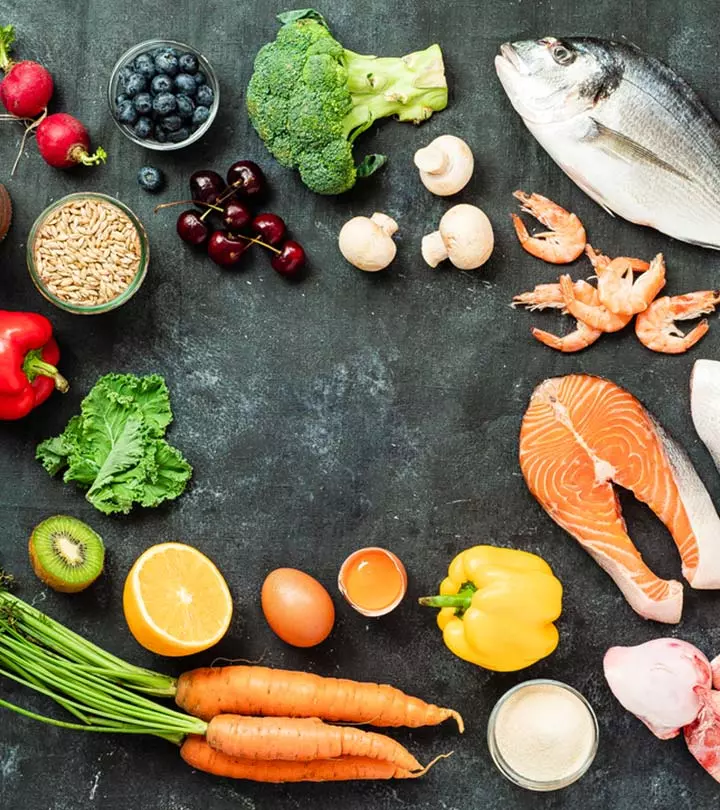
Image: Shutterstock
Collagen is booming in the health and fitness industry right now! Foods rich in collagen can do wonders not only for your skin and hair but also your muscles and joints. But, before you start following a collagen diet, taking collagen supplements, or consuming innumerable cups of bone broth, you need to know what boosting collagen can do for your body, which foods to consume for increasing collagen intake, and much more. This article tells you everything you need to know about the benefits of collagen-rich foods. Let’s begin!
In This Article
Collagen: What Is It?
Collagen is one of the most important proteins that your body makes. It is the strongest of all the tissue fibers that make up connective tissues. Your skin, hair, bones, nails, joints, muscles, blood vessels, cartilagesi A resilient connective tissue that safeguards your bones and joints. , cells, placentai A transitory embryonic organ that develops in the uterus during pregnancy and provides nutrients to the fetus. , and other organs have collagen in them. Collagen is made up of three alpha chains. Each alpha chain is made up of thousands of amino acids (the building blocks of protein), with glycine, proline, and hydroxyproline being the most abundant (1).
Collagen is a crucial part of connective tissues responsible for giving structure, elasticity, and firmness to your body. Foods rich in collagen reinforce your body’s natural collagen production by stimulating the fibroblasts (cells in the skin) that make collagen (2).
And this leads you to the next part— what is a collagen diet?
The Collagen Diet: Know The Facts
The collagen diet is a way of eating that limits sugar intake and incorporates foods rich in collagen, a collagen food supplement, or foods that boost your body’s ability to produce collagen (3). Let’s look at some quick facts about it:
- Naturally, collagen as food is found in animal parts, like chicken, meat, fish, and dairy products (4).
- The body makes collagen on its own in a complex series of processes that involve amino acids, copper, zinc, and vitamin C (5), (6), (7), (8).
- With age, the body’s collagen production becomes low and collagen diets may help reverse some of the signs of aging (9).
- Collagen injections or collagen supplements also form a part of certain collagen diets (10).
- Research on collagen drinks and supplements is in its initial stages with promising results. However, there is not enough evidence to support its complete safety. ( 11), ( 12).
Note:
According to the American Council on Science and Health, collagen supplements are not evaluated by the Food and Drug Administration (FDA). So, do enough research before you buy any supplements (13).
 Quick Tip
Quick TipIf you want to steer clear of supplements (more details on this coming up later) or injections, then how do you increase collagen naturally? The answer is, through eating right. So, let’s see if we can find some healthy foods and herbs rich in collagen.
References
Articles on StyleCraze are backed by verified information from peer-reviewed and academic research papers, reputed organizations, research institutions, and medical associations to ensure accuracy and relevance. Read our editorial policy to learn more.
You can approach the collagen diet in several ways. You can eat collagen-rich foods for hair and skin or you can take a collagen food supplement with your doctor’s advice. Either way, you stand to gain from incorporating foods high in collagen, and foods that help you make more collagen in your body, in your diet.
1. Foods Rich In Collagen
Consume collagen-rich foods to boost hair health, skin health, and nail health. Unknown to most people, collagen may also improve gut health. The collagen you eat breaks down into amino acids, which are then distributed to the parts of your body where collagen can (or needs to) be made. Glycine, lysine, proline, leucinei The amino acid that helps break down proteins and repairs muscles. , hydroxyproline, and hydroxylysine are some of the essential amino acids for collagen production. According to the United States Department of Agriculture, meat is a good source of collagen (14).
- Beef

Beef is one of the best sources of amino acids, the building blocks of connective tissues. Beef is also a natural source of collagen and is widely used in the extraction process for making collagen peptides (supplements). So, when you are biting into a juicy steak, you are doing yourself a favor (15).
- Fish With Skin
The skin that you find on fish, especially sea-fish, is rich in collagen. Apart from that, fish is a great source of omega-3 fatty acids, which promote skin health (16).
- Chicken
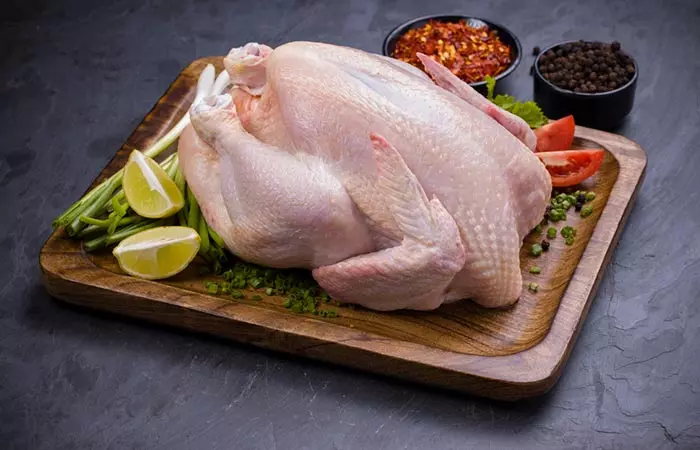
If you are a fan of lean meat and enjoy eating chicken, you are supplying your body with a ton of ingredients that it needs to cook up some collagen for you. Chicken neck and cartilage are exceptionally good sources, so you may want to prepare chicken stock/broth/soup with these for a collagen boost (17).
- Eggs
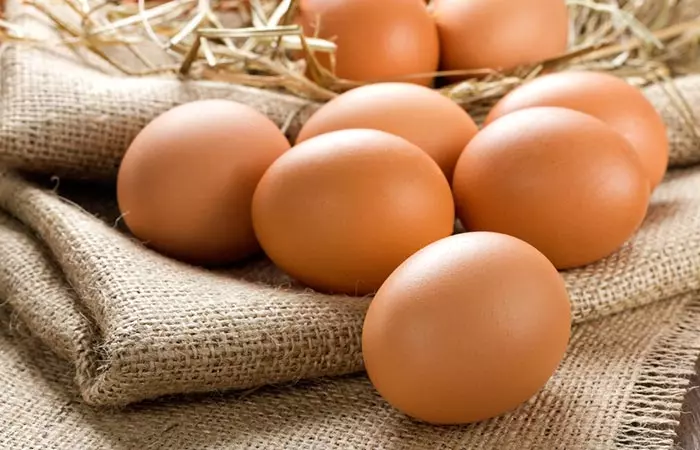
Eggs are a very healthy way to incorporate healthy proteins into your diet as they contain amino acids that make collagen (18).
- Bone Broth

Bone broth is made by simmering bones and connective tissues from beef, venison (deer), chicken, or turkey for a long time. The slow cooking process helps draw out the gelatin that breaks down into collagen in our body. If you don’t want to go through the long process (though it is worth it for the quality and taste), you can buy bone broth from stores. Commercially available bone broth may vary in quality, or availability of collagen as they are processed differently. Studies show that while bone broth contains some of the essential amino acids for collagen, it may not be a consistent enough source when compared to oral supplements (19).
2. Collagen Boosting Foods
There is a lack of collagen-rich foods vegetarian and vegan diets allow as most natural sources are animal-based. However, since your body is a robust collagen-making unit, you can always eat the ingredients your body uses as raw material for building collagen. Make sure you eat a wide variety of nutrient-dense foods, with emphasis on the nutrients crucial to the growth and upkeep of collagen.
- Vitamin C
Your body cannot naturally produce vitamin C, so it is important to incorporate foods containing vitamin C into your diet. What’s that got to do with collagen? you may ask. Well, from your body’s perspective, everything. That’s because your body uses vitamin C to make its own collagen. If you don’t have enough of it, you not only will show signs of aging faster but also open yourself up to serious health issues (20).
Red and green peppers, citrus fruits, berries, blackcurrants, broccoli, brussels sprouts, and potatoes are some great sources of this key nutrient.
- Zinc
Zinc plays an important role in the development and maintenance of bones. This role of zinc is also linked to the part it plays in the making of collagen in the body. Studies have shown that zinc increases the performance of cells responsible for collagen production in bone tissues (21).
Meat, shellfish, oysters, chickpeas, nuts, fortified cereals, bread, and dairy products are good sources of zinc.
- Copper
You need to up your copper intake for boosting collagen production as it plays a vital role in the development and maintenance of your connective tissues. Elastin (a vital protein that lends elasticity to connective tissues in the skin) and collagen can cross-link and form bonds thanks to the availability of copper (22).
Nuts, prunes, dark leafy vegetables, potatoes, black pepper, pork, shellfish like oysters, poultry, and organ meats like liver and kidneys are good sources from where you can get your copper fix.
- Omega-3 Fatty Acids
You can keep your ligaments in shape by consuming more omega-3 fatty acids. A study has found that omega-3 can enhance the collagen forming fibroblasts (cells that make connective tissues) working in the ligaments of your body (23).
Seeds like flaxseed, sunflower seeds and chia, walnuts, Brussel sprouts, kale, spinach, and fatty fish like mackerel, sardines, and salmon are excellent sources of omega-3.
- Antioxidants
Antioxidants do not directly make collagen for you. But, they do something very crucial for your skin. Not only age, but free radicals in your skin are also responsible for collagen loss. Antioxidants are free radical scavengers and can protect collagen in your skin from excessive damage (24).
Dark chocolate, beans, berries, kale, spinach, red cabbage, onions, prunes, apricot, broccoli, and green tea are only a few of the vast sources of antioxidants that you can include in your collagen diet.
- Legumes
Legumes are another food source believed to be beneficial for collagen production. They are an extremely nutritious substitute for meat. While they are rich in fiber, protein, carbs, and B vitamins, they also contain some of the above-mentioned minerals like zinc and copper that may stimulate collagen production (25). Furthermore, they are naturally low in fats and cholesterol, making them a good food option for many healthy diets. This diverse nutrition profile may prove to be beneficial for collagen production in the body.
Incorporate food items such as lentils, chickpeas, peas, beans (lima, kidney, common types), soybeans, and peanuts in your diet to avail their benefits.
If you are wondering why it is so important to boost the body’s collagen production, the answer’s coming right up!
What Happens To Your Body If Collagen Is Low
By the time you are in your early twenties, your body has already started losing collagen. When you hit your forties, you can expect a one percent loss in collagen every succeeding year. By the time you are eighty years old, your body produces less than 75 percent of the collagen it used to produce when you were a young adult. Besides age, several other factors may lead you to lose collagen—free radicals, smoking, alcoholism, disease, and a nutrient-deficient diet (26).
The numbers may seem quite alarming, especially since collagen is a vital component for healthy skin, hair, bones, joints, and more. So, let’s see what some of the symptoms of a drop in your body’s collagen levels are:
- Skin Aging

Collagen loss leads your skin to lose elasticity, firmness, and protection against natural wear and tear. Wrinkles, deep lines, crepey, and sagging skin which is more prone to damage from pollutants and UV rays are some of the signs that your skin is losing collagen (27).
- Joint Pain
Collagen may boost joint health. The cartilages are designed to help your bones glide over each other, without friction. With collagen loss, those cartilages wear down and lead to a condition called osteoarthritis. Stiff joints, aches, and swelling are the most commonly reported symptoms of osteoarthritis (28).
- Weak Bones
This might come as a surprise to many, but collagen is needed for improved bone health. The structure and strength of your bones depend greatly on collagen, which accounts for more than 80 percent of the proteins in them. Weak, brittle bones that are more susceptible to injuries and fractures can be linked with a loss of collagen in the connective tissues of your bones (29). According to another study, loss of collagen may even be responsible for osteoporosis (30).
- Stiffness In Ligaments And Tendons
The tendons in your body connect your bones to your muscles, while the ligaments connect your bones. Both tendons and ligaments are composed of connective tissues that contain collagen and if you lose enough of it, you can experience stiffness and mobility problems (31).
With so many issues that you may face if your collagen levels drop, it is clear that your body needs collagen for hair growth, skin health, and other body functions. Read on to learn more about the benefits of following a collagen diet.
Health Benefits Of A Collagen Diet
If you eat collagen-rich foods, you may reverse signs of skin aging. Studies have revealed that oral collagen can improve the thickness of the epidermis and make the skin hydrated. It also reduces wrinkles and age lines on facial skin, besides affecting the elasticity and smoothness of skin positively (32).
You can also reap the benefits of eating foods rich in collagen with an improvement in joint pain (33).
There is more good news for you. A study has noted that certain collagen peptides can improve bone density in postmenopausal women (34). The result? Lowered risk of osteoporosis and stronger bones.
 Did You Know?
Did You Know?So, should you get on a collagen diet? Read the drawbacks and make a more informed decision.
Collagen Diet: The Drawbacks
- You can end up relying too heavily on collagen supplements instead of making positive lifestyle changes and nurturing healthy food habits.
- You may have allergic reactions to ingredients in collagen supplements or nuts/shellfish. It is advised that you speak to your doctor before introducing anything new to your diet.
- Some people report digestive issues with a high protein diet.
- The diet is animal product-centric, so it is not very vegan-friendly.
You may want to take the supplement route if your body is struggling to absorb nutrients from foods directly or if your doctor has recommended it. But do collagen supplements work? Fortunately, they do. But there are various precautions you need to consider while having them. Read on to find out more about collagen supplements.
Collagen Supplements: Safety and Precautions
You can get hold of a collagen food supplement and put it in your morning coffee, smoothies, and even water. Hydrolyzed collagen (or collagen peptides) is easily absorbed by the body as it is processed and a broken-down version of animal collagen. It is also tasteless, odorless, and colorless and likely won’t put you off. Preliminary research has found it to be safe and effective for improving skin elasticity and moisture retention (35).
But, before you race ahead on the path of least resistance, take a look at some important safety concerns.
- Unregulated Market
Supplements are not regulated by the Food and Drug Administration (FDA) agency. That means that the supplements in the market may not follow the same standard procedures. Inconsistency in terms of quantity of processed collagen and its effectiveness is not guaranteed.
- Not For Vegans Or Vegetarians
Most hydrolyzed collagen is derived from animal and fish products. That makes them unavailable to vegans and vegetarians.
- Allergic Reactions
If you are allergic to seafood, or shellfish, you may be at risk of developing allergic reactions to collagen supplements. Talk to your doctor to rule that out.
- Concerns About Toxicity
There are some concerns about collagen supplements carrying a risk of viral infections or other environmental toxins. There is not enough evidence to prove or disprove these concerns.
- Potential Side Effects
There were no potential side effects reported on clinical trials involving collagen supplements, according to a placebo-controlled, randomized study (35).
Judy Folks, a skin care blogger, shares her experience of taking skin care supplements such as collagen and lutein: “One of the first supplements I tried was collagen, which I heard helps maintain skin elasticity and firmness. I chose a water-soluble collagen powder and took it on an empty stomach every morning. I must say, after using it for a while, I did notice some improvements! My skin felt plumper, and fine lines seemed to have reduced a bit. Of course, this might also be attributed to my other skin care routines, but collagen has indeed become one of my daily supplements (i).”
Collagen supplements may be safe and effective, but you still have to take care of your diet and skin to get the most out of them. Read on to find a checklist to restore your skin and reverse some signs of stress, pollution, and aging.
How To Restore Collagen In The Face
You can restore the collagen in your face with anti-aging techniques:
- Follow a healthy collagen diet.
- Use a collagen supplement if your doctor gives you the go-ahead.
- Use sunscreen and protect your face from sun damage.
- Stop smoking.
- Hydrate yourself.
- Sleep enough and reduce stress.
Frequently Asked Questions
Does coffee destroy collagen?
No, coffee does not destroy collagen but may affect its rate of production.
Does yogurt contain collagen?
Yogurt is a good source of amino acids, especially lysine, which acts as a precursor for collagen synthesis.
Do egg yolks have collagen?
Eggs are a good source of collagen, with the shell, yolk, and egg white all containing some amounts.
Does coconut oil rebuild collagen?
Coconut oil boosts the production of collagen and encourages the regeneration of cells in your skin.
Does avocado have collagen?
Avocado is rich in omega-3 fatty acids, which aid the synthesis of collagen.
How long does it take to rebuild collagen?
While it depends on many factors like age, lifestyle, sleep, and nutrition quality, it generally takes somewhere between 3-12 weeks to restore collagen.
Key Takeaways
- Collagen is an essential protein found in skin, hair, bones, nails, joints, muscles, blood vessels, cartilages, cells, placenta, and other organs.
- Beef, fish with skin, chicken, eggs, and bone broth are rich in collagen.
- You can experience skin aging, joint pain, and stiffness in ligaments and tendons if the collagen level in your body drops.
Illustration: Collagen-Rich Foods: Health Benefits & Drawbacks
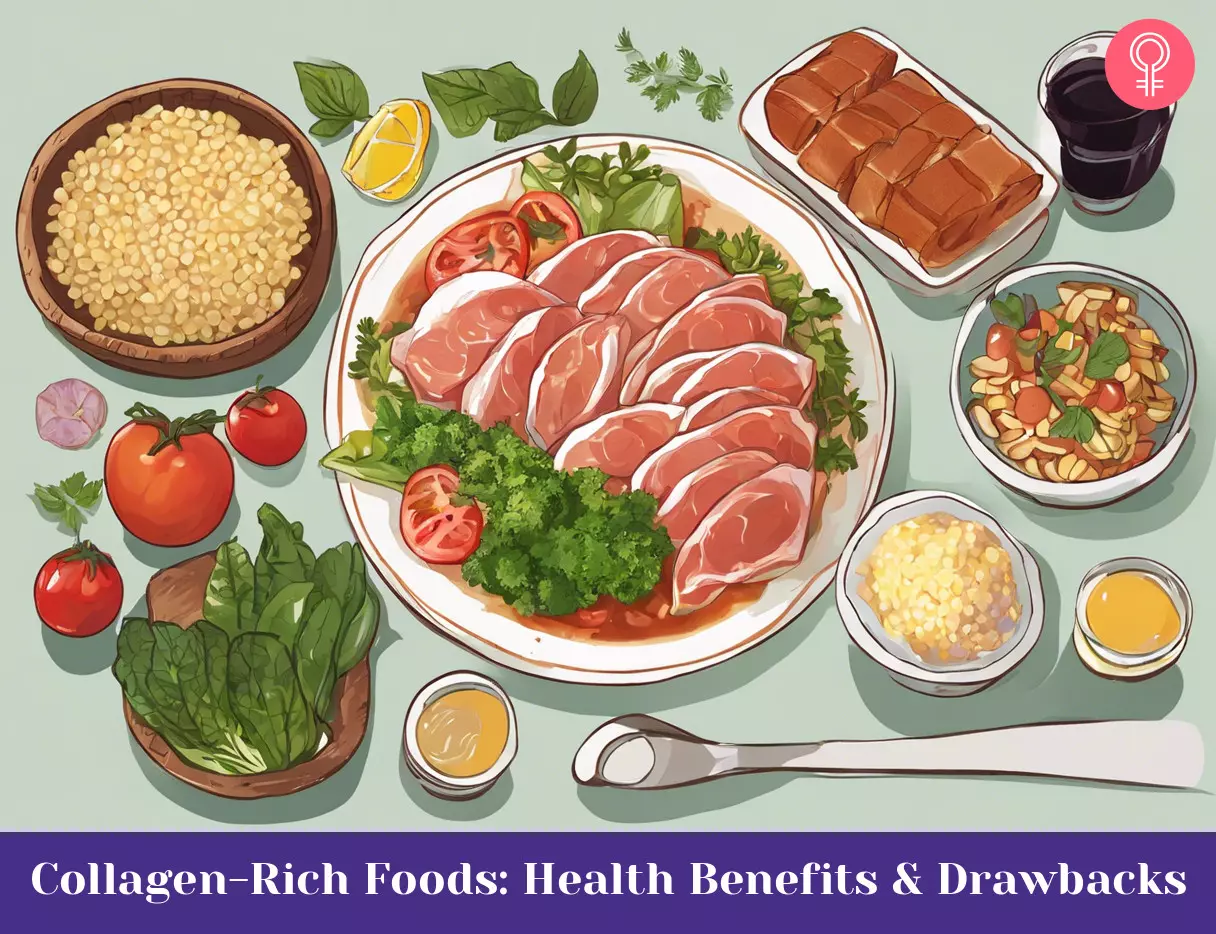
Image: Stable Diffusion/StyleCraze Design Team
Discover delicious collagen-rich foods to help you achieve healthy skin, hair, and joints in the video below. Learn how to incorporate these foods into your diet for maximum benefits.
Personal Experience: Source
StyleCraze's articles are interwoven with authentic personal narratives that provide depth and resonance to our content. Below are the sources of the personal accounts referenced in this article.
i. My Experience with Skincare Supplements! Are Collagen and Lutein Really Effective?https://xiekai080.medium.com/my-experience-with-skincare-supplements-are-collagen-and-lutein-really-effective-c1c7533889a2
References
Articles on StyleCraze are backed by verified information from peer-reviewed and academic research papers, reputed organizations, research institutions, and medical associations to ensure accuracy and relevance. Read our editorial policy to learn more.
- Hydrolyzed Collagen—Sources and Applications
https://www.ncbi.nlm.nih.gov/pmc/articles/PMC6891674/ - Skin Collagen through the Life Stages: Importance for Skin Health and Beauty
https://www.oaepublish.com/articles/2347-9264.2020.153 - The Role of Functional Foods in Cutaneous Anti-aging
https://www.ncbi.nlm.nih.gov/pmc/articles/PMC4390761/ - Hydrolyzed Collagen—Sources and Applications
https://www.ncbi.nlm.nih.gov/pmc/articles/PMC6891674/ - Proline Precursors and Collagen Synthesis: Biochemical Challenges of Nutrient Supplementation and Wound Healing
https://academic.oup.com/jn/article/147/11/2011/4743236 - Copper and the Synthesis of Elastin and Collagen
https://pubmed.ncbi.nlm.nih.gov/6110524/ - Zinc May Increase Bone Formation through Stimulating Cell Proliferation Alkaline Phosphatase Activity and Collagen Synthesis in Osteoblastic Mc3t3-e1 Cells
https://e-nrp.org/DOIx.php?id=10.4162/nrp.2010.4.5.356 - Discovering the Link Between Nutrition and Skin Aging
https://www.ncbi.nlm.nih.gov/pmc/articles/PMC3583891/ - Skin Anti-aging Strategies
https://www.ncbi.nlm.nih.gov/pmc/articles/PMC3583892/ - Oral Ingestion of Collagen Hydrolysate Leads to the Transportation of Highly Concentrated Gly-Pro-Hyp and Its Hydrolyzed Form of Pro-Hyp into the Bloodstream and Skin
https://pubs.acs.org/doi/10.1021/acs.jafc.6b05679 - Oral Collagen Supplementation: A Systematic Review of Dermatological Applications
https://pubmed.ncbi.nlm.nih.gov/30681787/ - Collagen Supplements
https://www.publish.csiro.au/hc/pdf/HC15947 - Don’t Put Collagen In Your Coffee
https://www.acsh.org/news/2019/09/18/dont-put-collagen-your-coffee-14293 - United States Department of Agriculture Agricultural Marketing Service | National Organic Program Document Cover Sheet
https://www.ams.usda.gov/sites/default/files/media/CollagenGelPetition.pdf - Amino Acid Makeup of Beef
https://pubmed.ncbi.nlm.nih.gov/7269220/ - Effects of Sizes and Conformations of Fish-scale Collagen Peptides on Facial Skin Qualities and Transdermal Penetration Efficiency
https://pubmed.ncbi.nlm.nih.gov/20625414/ - Ingestion of Biocell Collagen® a Novel Hydrolyzed Chicken Sternal Cartilage Extract; Enhanced Blood Microcirculation and Reduced Facial Aging Signs
https://www.ncbi.nlm.nih.gov/pmc/articles/PMC3426261/ - Protein and Amino Acid Content in Four Brands of Commercial Table Eggs in Retail Markets in Relation to Human Requirements
https://www.ncbi.nlm.nih.gov/pmc/articles/PMC7142600/ - Bone Broth Unlikely to Provide Reliable Concentrations of Collagen Precursors Compared With Supplemental Sources of Collagen Used in Collagen Research
https://pubmed.ncbi.nlm.nih.gov/29893587/ - Discovering the Link Between Nutrition and Skin Aging
https://www.ncbi.nlm.nih.gov/pmc/articles/PMC3583891/ - Zinc May Increase Bone Formation through Stimulating Cell Proliferation Alkaline Phosphatase Activity and Collagen Synthesis in Osteoblastic Mc3t3-e1 Cells
https://e-nrp.org/DOIx.php?id=10.4162/nrp.2010.4.5.356 - Copper and the Synthesis of Elastin and Collagen
https://pubmed.ncbi.nlm.nih.gov/6110524/ - Omega-3 Fatty Acids Enhance Ligament Fibroblast Collagen Formation in Association with Changes in Interleukin-6 Production
https://pubmed.ncbi.nlm.nih.gov/10632966/ - Skin Anti-aging Strategies
https://www.ncbi.nlm.nih.gov/pmc/articles/PMC3583892/ - Legumes: Health Benefits and Culinary Approaches to Increase Intake
https://www.ncbi.nlm.nih.gov/pmc/articles/PMC4608274/ - Hydrolyzed Collagen—Sources and Applications
https://www.ncbi.nlm.nih.gov/pmc/articles/PMC6891674/ - Skin Collagen through the Life Stages: Importance for Skin Health and Beauty
https://www.oaepublish.com/articles/2347-9264.2020.153 - Type Ii Collagen Degradation and Its Regulation in Articular Cartilage in Osteoarthritis
https://www.ncbi.nlm.nih.gov/pmc/articles/PMC1766700/ - The Role of Collagen in Bone Strength
https://www.researchgate.net/publication/7427651_The_role_of_collagen_in_bone_strength - Osteoporosis a Unitary Hypothesis of Collagen Loss in Skin and Bone
https://www.researchgate.net/publication/7791823_Osteoporosis_a_unitary_hypothesis_of_collagen_loss_in_skin_and_bone - Age-related Changes in Structure and Extracellular Matrix Protein Expression Levels in Rat Tendons
https://www.ncbi.nlm.nih.gov/pmc/articles/PMC3824999/ - A Collagen Supplement Improves Skin Hydration Elasticity Roughness and Density: Results of a Randomized Placebo-Controlled Blind Study
https://www.ncbi.nlm.nih.gov/pmc/articles/PMC6835901/ - Improvement of Activity-related Knee Joint Discomfort Following Supplementation of Specific Collagen Peptides
https://cdnsciencepub.com/doi/10.1139/apnm-2016-0390#.X0v7bNNKjlw - Specific Collagen Peptides Improve Bone Mineral Density and Bone Markers in Postmenopausal Women—A Randomized Controlled Study
https://www.ncbi.nlm.nih.gov/pmc/articles/PMC5793325/ - Oral Collagen Supplementation: A Systematic Review of Dermatological Applications
https://pubmed.ncbi.nlm.nih.gov/30681787/ - A Collagen Supplement Improves Skin Hydration Elasticity Roughness and Density: Results of a Randomized Placebo-Controlled Blind Study
https://www.ncbi.nlm.nih.gov/pmc/articles/PMC6835901/
Read full bio of Dr. Archna Agrawal
Read full bio of Varsha Patnaik
Read full bio of Arshiya Syeda
Read full bio of Payal Karnik






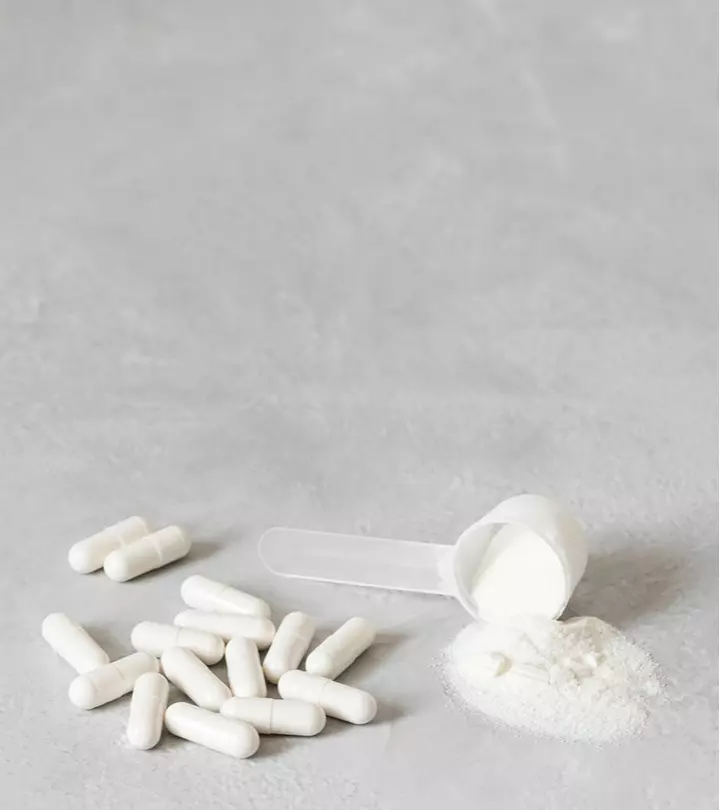

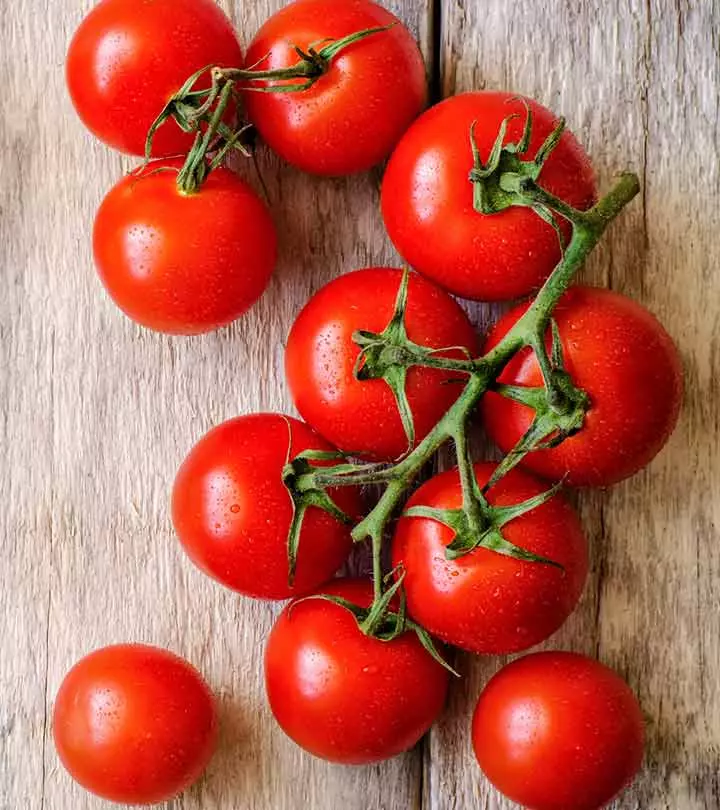

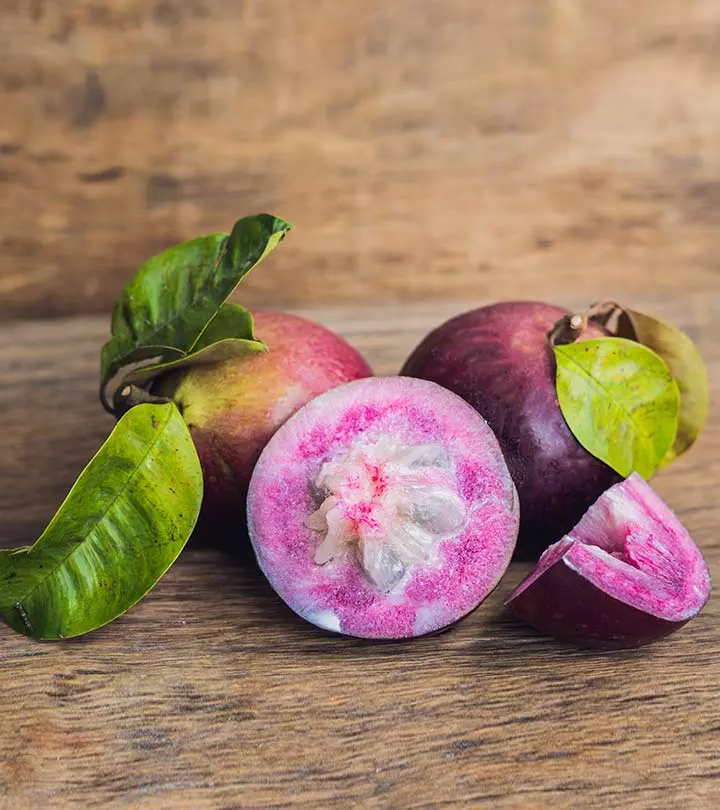



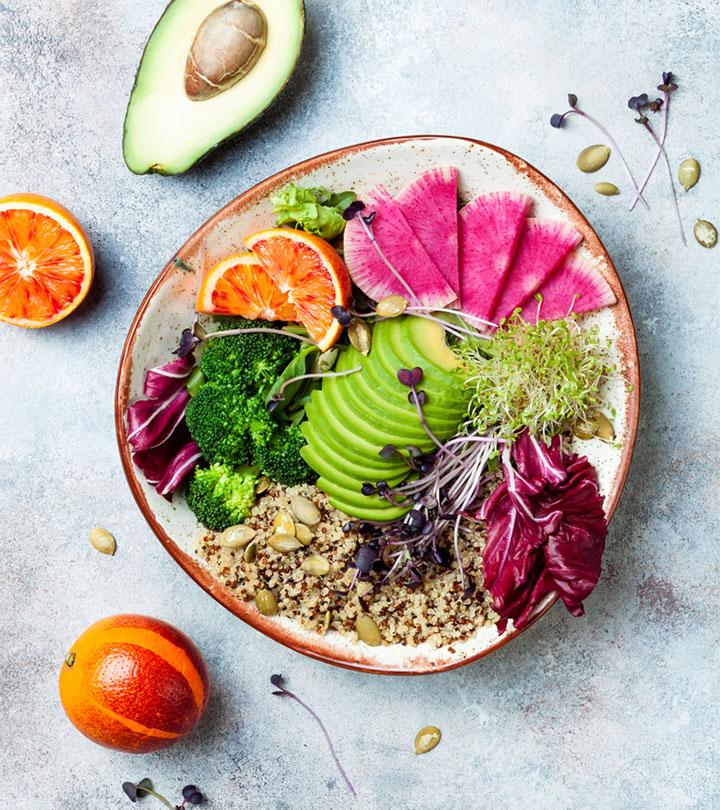
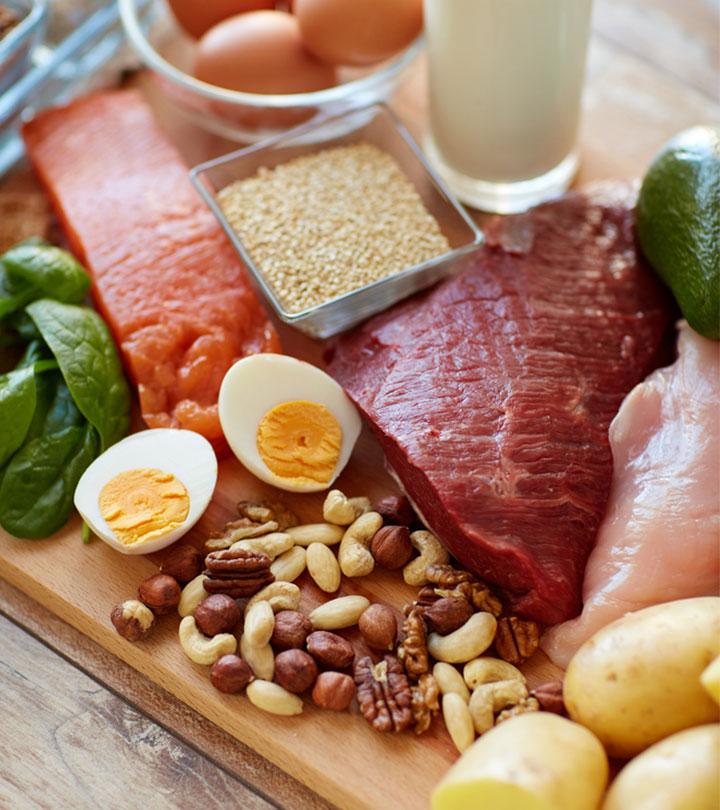




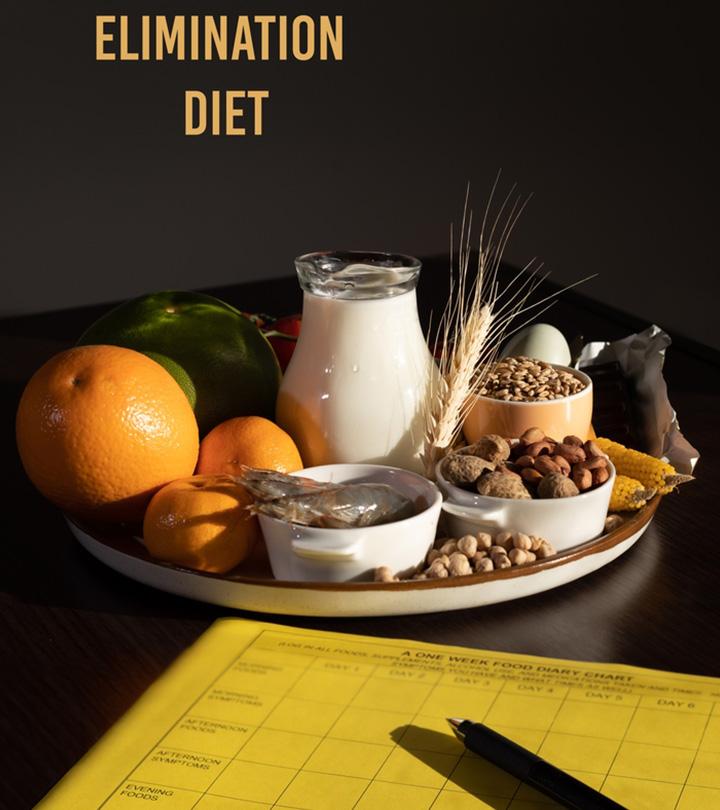
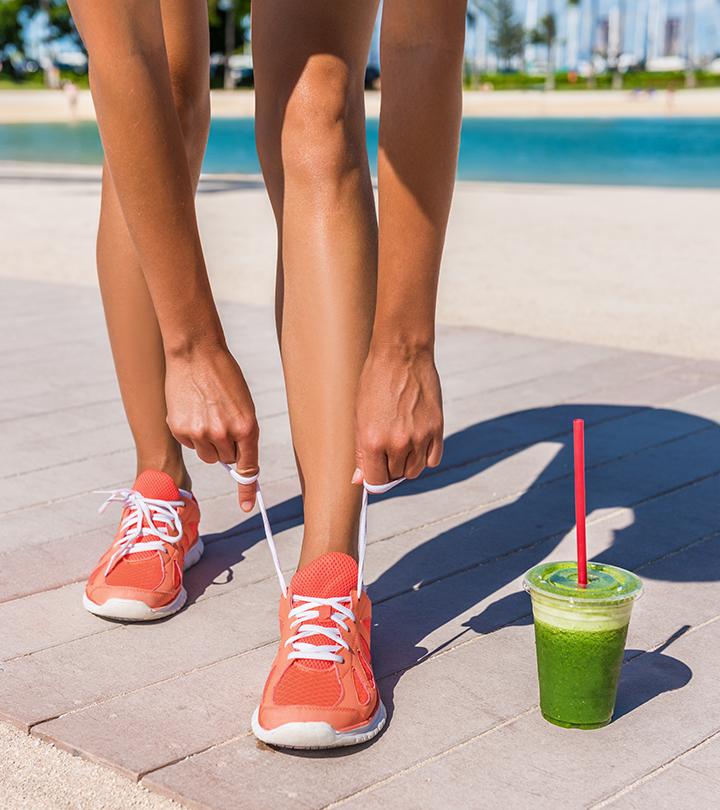
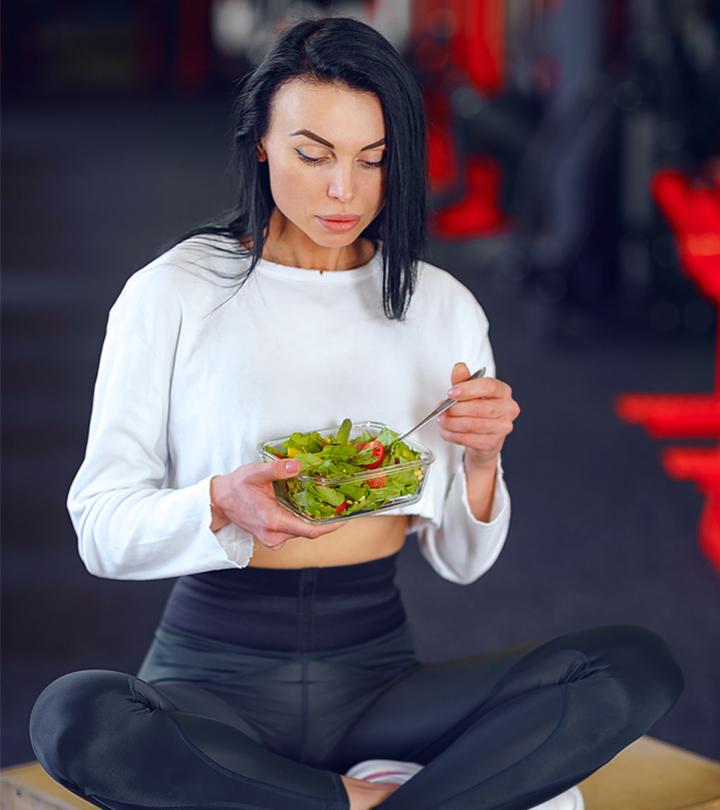

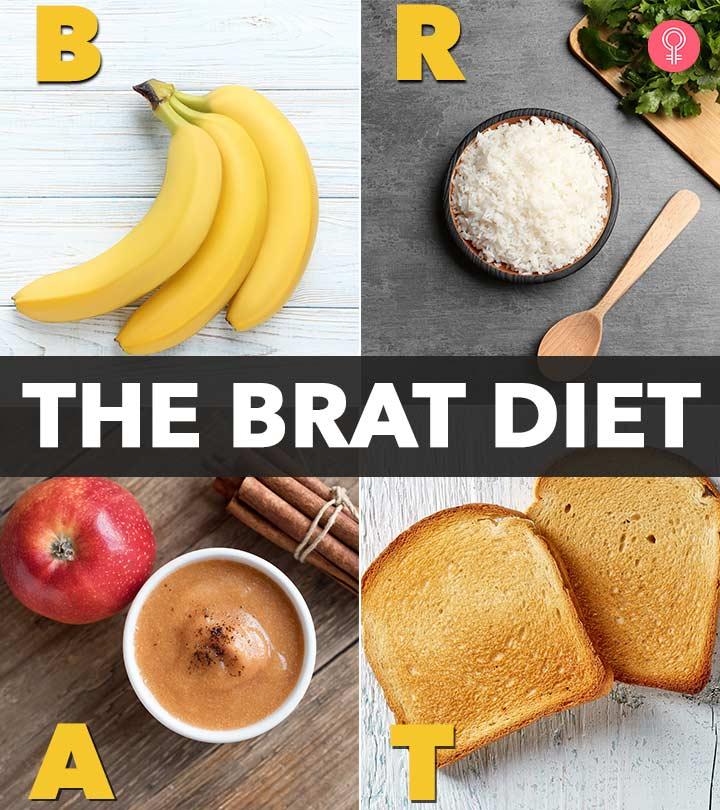

Community Experiences
Join the conversation and become a part of our empowering community! Share your stories, experiences, and insights to connect with other beauty, lifestyle, and health enthusiasts.